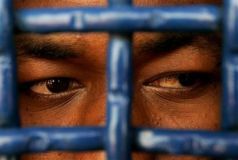Israeli dilemma over Darfur refugees
June 6, 2006 (JERUSALEM) — IN 2000 Sanka, a 30-year-old Sudanese Muslim, fled his village in Darfur after the infamous Janjawid – Arabs loyal to the Khartoum Government – arrived on horseback with machineguns, killing his father and stealing camels and cattle.
 Sanka rode on a tobacco lorry to the town of Niala, where he waited in vain for his family. He then headed east, looking for work, but was rounded up and beaten by the Sudanese police. He scraped together the money for a one-way airfare to Egypt, and he spent the next four years drifting around Cairo and Aswan, until he was arrested in late 2004.
Sanka rode on a tobacco lorry to the town of Niala, where he waited in vain for his family. He then headed east, looking for work, but was rounded up and beaten by the Sudanese police. He scraped together the money for a one-way airfare to Egypt, and he spent the next four years drifting around Cairo and Aswan, until he was arrested in late 2004.
Facing expulsion to Sudan, he bribed his way out of custody and took a bus to the Sinai Desert bordering Israel. He wandered lost for 24 hours, un- til he stumbled across the blue-and-white flag of an Israeli military border post. “I expected to get shot in the head. If that had happened I would have said to them, ?God bless you’. Everything was so hopeless for me,” he told The Times yesterday.
Sanka was not shot. The Israelis patched him up and held him for a month before attempting to send him back to Egypt. The Egyptians refused to take him. He spent a year in an Israeli prison before being sent to a kibbutz, while his fate was decided. “Sudan is the enemy of Israel. You are a citizen of that country, so we can’t release you,” a judge told him.
Sanka – not his real name – is not alone in his extraordinary five-year odyssey from an Arab state to a Jewish one, and from a country in the grip of one genocide to a nation built on the ashes of another.
He was merely a pioneer, and ever more Sudanese – Muslims and Christians – have followed in his footsteps, desperate to escape the conflicts in Darfur and southern Sudan that have cost more than two million lives.
There are 220 Sudanese refugees being held in Israeli prison cells, army bases and remote kibbutzes. The Israeli Government believes that many more may have entered the country undetected, using Beduin smugglers to take them across the unfenced border. The influx has accelerated sharply since December.
Technically the Sudanese are citizens of what Israel deems an enemy state and cannot stay. But their cause has been taken up by Holocaust campaigners and civil rights groups, who argue that Israel, of all countries, should give refuge to people fleeing genocide. “We cannot ignore refugees of the Darfur genocide when they knock on our door,” Avner Shalev, the director of Israel’s Yad Vashem Holocaust Memorial, said. He has written to Ehud Olmert, the Israeli Prime Minister, comparing their plight to Jews who in vain sought sanctuary from European countries during the Second World War.
Indeed, their Sudanese passports are stamped “all countries except Israel”, and they face execution if their Government learns that they have even visited the Zionist state. Civil rights groups have filed High Court petitions and cite on their letterheads the Biblical injunction: “You shall not wrong a stranger or oppress him, for you were strangers in the land of Egypt” (Exodus XXII, 20). They accuse the Government of violating international law prohibiting discrimination in asylum policies.
Michael Bavly, representative of the UN High Commissioner for Refugees (UNHCR) in Israel, said that the law should distinguish “between an enemy citizen who is a perpetrator and an enemy citizen who is a victim”.
Mark Regev, an Israeli Foreign Ministry spokesman, said that there was no question of the Sudanese being sent back to a regime that could kill them. But Israel was not their first country of refuge, and the small Jewish state could not cope with a flood of asylum-seekers. “Israel has no desire to send these people back to the terrible place they came from,” he said. “We are working with the UNHCR to try to find a humanitarian solution for these people. In the meantime . . . we are trying to make the conditions of their stay in this country as pleasant as possible.”
As the debate rages, many of the Sudanese sit in the Maasiyahu prison or army bases. Others, such as Sanka, have been released to isolated kibbutzes, where they are free to work but their movements are restricted.
Sanka whiles away the time working as a gardener and reading Great Expectations. “The Israeli Government should understand that we are not the people they should be afraid of,” he said.
“We are not the people who hate others because of their religion or race. But because of the way the Government of Sudan behaves, everything is about Islam.”
(The Times)
